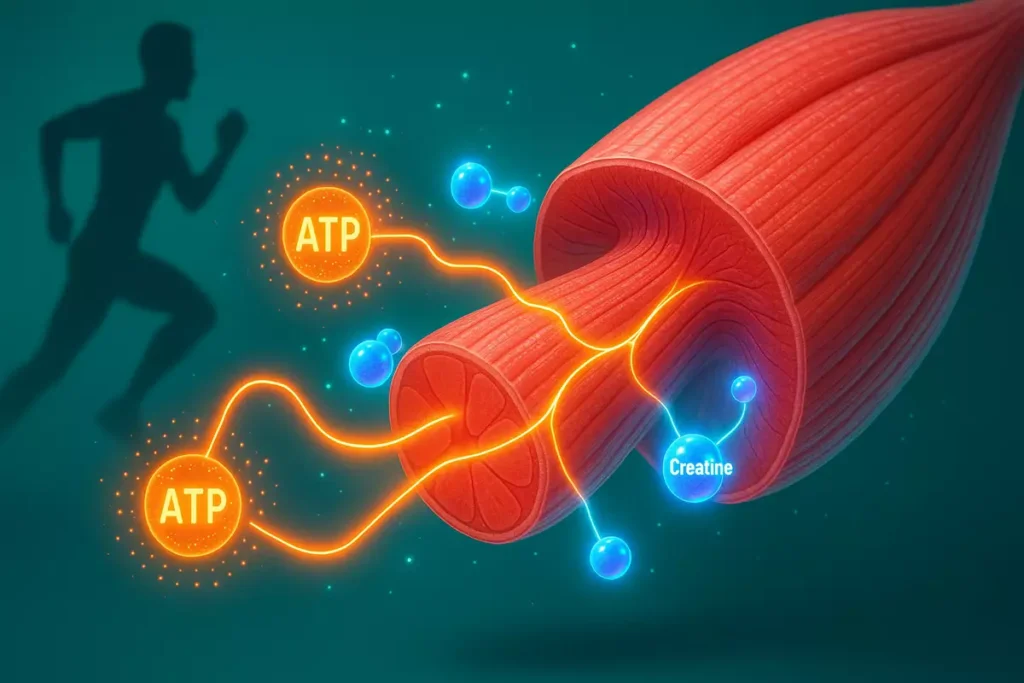Runners and endurance athletes often overlook creatine, thinking it’s just for bodybuilders.
The truth? This powerhouse supplement can help you sprint faster, recover quicker, and power through tough training sessions.
With years of personal experience and coaching athletes who’ve used creatine successfully, I’ll show you exactly how it can boost your performance—without slowing you down.
Table of contents
- Does Creatine Help Runners and Endurance Athletes?
- How Creatine Works in the Body
- Key Benefits for Runners and Endurance Athletes
- Possible Drawbacks and Myths
- How to Use Creatine for Endurance Training
- Who Should or Shouldn’t Take Creatine
- Practical Tips for Safe and Effective Supplementation
- Conclusion – Is Creatine Worth It for Runners?
Does Creatine Help Runners and Endurance Athletes?
If you’ve ever thought creatine was only for bodybuilders, you’re not alone.
I used to believe the same until I tried it during my own running and endurance training.
The truth is, creatine monohydrate can help runners and endurance athletes in practical ways—especially with sprinting, recovery, and power output during high-intensity moments.
Let’s break it down simply and share real-world experiences so you can decide if it’s right for you.
How Creatine Works in the Body

Creatine helps your muscles quickly regenerate ATP—the main energy currency for explosive movements.
In bodybuilding, this translates to lifting more weight.
For runners and endurance athletes, it means sharper sprints, stronger hill climbs, and faster recovery between intervals.
It won’t magically make you run longer distances, but it can give you that extra edge when you need to push hard.
If you want to understand how it compares to other supplements, check out BCAAs vs Creatine for Strength and Size.
Key Benefits for Runners and Endurance Athletes
From my personal use, the first thing I noticed was stronger sprint finishes during 5K runs.
My legs felt less fatigued when accelerating.
One of my triathlete clients, Lucas, said creatine helped him power through tough cycling-to-running transitions during Ironman training.
Another marathon runner I coach, Sofia, found she could handle uphill segments better and experienced less post-run soreness.
The main benefits include:
- Improved sprint and finishing speed
- Enhanced recovery between intervals
- Muscle protection during long training sessions
Possible Drawbacks and Myths

Creatine often gets a bad reputation for water retention and weight gain.
I did gain about 1.5 kg in the first week, but it was mostly water and didn’t slow me down.
Most runners I’ve coached experienced the same.
Another myth is that creatine only works for strength athletes.
Research and real-world results show that it supports high-intensity bursts and recovery for endurance athletes as well.
If you’re curious about what happens when you stop using it, read this guide on Creatine Effects After Stopping.
How to Use Creatine for Endurance Training
I’ve tested different protocols and found the simplest, most effective method is 5g daily without a loading phase.
I recommend taking it post-workout with carbs and protein to help your body absorb it better.
While you can do a loading phase (20g daily for 5 days), it’s usually unnecessary for runners and may increase temporary water weight.
Staying hydrated (at least 3 liters/day) is crucial for avoiding cramps and maximizing performance.
For more details, see this full guide on Daily Creatine Monohydrate Use and tips on Mixing Creatine with Juice.
Who Should or Shouldn’t Take Creatine

Creatine is particularly helpful for:
- Sprinters who need explosive starts and finishes
- Trail runners facing tough climbs
- Triathletes who want smoother transitions and recovery
If you’re an ultra-marathon runner who prioritizes being as light as possible, creatine might not be the best fit unless you’re in a strength-building block.
And if you prefer to rely purely on natural performance gains, here’s how you can Build Muscle Without Creatine.
Practical Tips for Safe and Effective Supplementation
From coaching experience and personal trials, here are my top tips:
- Drink plenty of water daily
- Combine creatine with beta-alanine and electrolytes during heavy training phases (stack guide here)
- Monitor your weight and adjust carb intake if needed
- Stick to consistent, moderate dosing for best results
Some athletes also wonder whether creatine is better than pre-workout supplements.
I’ve compared them in detail here: Creatine vs Pre-Workout.
Conclusion – Is Creatine Worth It for Runners?

After years of using creatine and seeing it work for multiple clients, my verdict is yes—it’s worth it for most runners and endurance athletes.
It’s not going to turn you into a marathon winner overnight.
But if you want stronger sprints, better recovery, and improved training quality, creatine monohydrate is one of the safest and most researched supplements you can add to your plan.
Like I often tell my athletes:
“Sometimes that extra edge in endurance sports doesn’t come from running more miles—it comes from recovering faster and finishing stronger.”
Creatine can help you do exactly that.



Leave a Reply